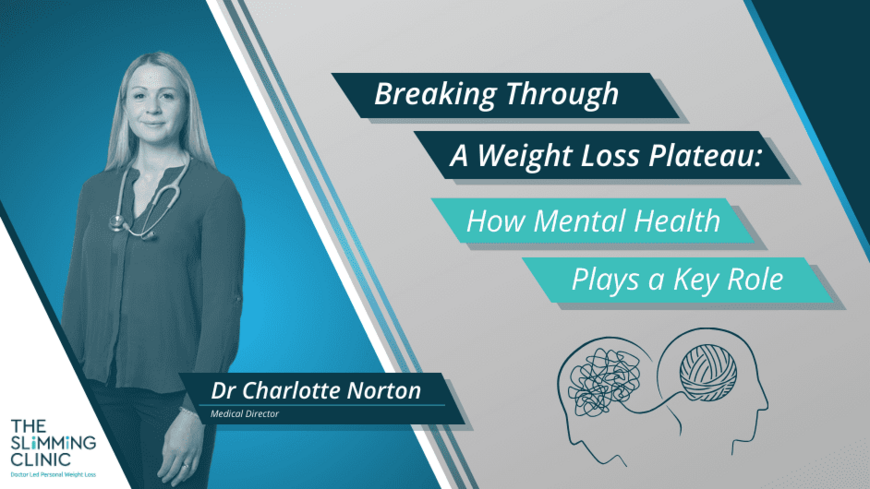Breaking Through A Weight Loss Plateau
Weight Loss Plateau: What You Need To Know
Breaking through a weight loss plateau is a common challenge for even the most dedicated dieters. Just when you think you're making progress, the scale refuses to move. This situation can be frustrating, but it's important to remember that it’s a normal part of the weight loss journey.
Understanding why a weight loss plateau happens and what to do about it, can help you overcome this hurdle to continue towards your weight loss goals. Let's dive into some frequently asked questions, the role of mental health, and tips on how you can overcome a weight loss plateau.
What is a Weight Loss Plateau?
A weight loss plateau happens when your weight remains steady despite following your weight loss routine. It’s crucial to determine whether you’ve truly reached a plateau. If it's less than a week, you've probably been weighing yourself too frequently. We advise weighing yourself no more than twice a week.
If you weigh yourself too frequently you will capture the natural fluctuations in your weight caused by fluid retention, hormonal changes, bowel movements, water and food intake. If your weight has not changed or you have even gained weight over a period of more than a week, you need to ask yourself if there have been any changes to that time period that are out of your normal routine?

Look back and be honest with yourself, have you been sticking to the lifestyle changes you implemented when you had been actively losing weight? If you feel that these lifestyle changes are unsustainable, then you need to reevaluate them. For maintainable weight loss to be successful, you need to be able to implement changes you feel can be lifelong because the minute you stop the changes that are causing weight loss and you return to your ‘old eating habits’ your weight loss will stop or more likely you will regain the weight you have lost.
Will a Weight Loss Plateau Go Away on Its Own?
In some cases, a plateau may resolve naturally as your body adjusts to your new weight. However, actively reassessing your routine and making small changes will typically yield faster and more reliable results.
How Long Does a Weight Loss Plateau Last?
Plateaus can last anywhere from a few weeks to several months. However, they are not permanent. With small adjustments to your weight loss routine, you can jumpstart your progress.
The Role of Mental Health in Overcoming a Weight Loss Plateau
Mental health plays a crucial role in achieving and sustaining weight loss, especially when facing a weight loss plateau. During this challenging phase, it’s easy to feel frustrated, disheartened, or even defeated. Addressing your mental and emotional well-being can make a significant difference in how you navigate this part of your journey.
Stress and Weight Loss
Stress triggers the release of cortisol, a hormone that can cause the body to retain weight and even lead to cravings for high-calorie, comfort foods. If you’ve reached a weight loss plateau, take time to assess your stress levels and incorporate stress-reducing activities into your routine, such as meditation or deep breathing exercises, yoga or tai chi, or just spending time in nature
Emotional Eating
Plateaus can sometimes trigger emotional eating, where food becomes a way to cope with feelings of frustration or disappointment. Recognising these patterns and finding healthier outlets like journaling, talking with a friend, or engaging in a hobby, can help you stay on track.
The Power of Positive Thinking
Maintaining a positive mindset is vital when dealing with a weight loss plateau. Instead of focusing on what the scale isn’t doing, shift your perspective to what you have achieved. Remind yourself of the reasons why you started this journey and the benefits you’ve already experienced, such as increased energy, improved mood, or better overall health.
Self-Compassion Matters
Being kind to yourself is essential. Weight loss is not just about physical transformation but also about fostering a healthy relationship with your body and mind. Practice self-compassion by recognising that plateaus are normal and not a reflection of failure.
7 Top Tips On How To Break The Weight Loss Plateau
Here are our top strategies on how to break the weight loss plateau:
1. Reassess Your Approach
When faced with a weight loss plateau, it’s crucial to take a step back and evaluate your current approach. Begin by reassessing your eating habits, exercise routine and overall lifestyle choices.
Sometimes, the body becomes accustomed to a particular routine, leading to a decrease in weight loss progress. Consider making changes such as adjusting your calorie intake, checking your portion sizes (download our portion size guide here), varying your exercise routine, or introducing new activities that challenge your body in different ways.
2. Mix Up Your Exercise Routine
Our bodies adapt to repetitive exercises over time, leading to diminished results. Break through your weight loss plateau by introducing new exercises and varying the intensity or duration of your workouts.
Incorporate strength training, high-intensity interval training (HIIT) or try different fitness classes. Not only will this help you overcome the plateau, but it will also keep your workouts interesting and enjoyable. Find out more about our weight loss membership platform here where you can get regular personalised exercise resources.
3. Focus on Non-Scale Victories (NSV)
Weight loss shouldn’t be solely determined by the number on the scale. Celebrate and recognise the non-scale victories that come with a healthier lifestyle.
These victories may include increased energy levels, improved sleep, reduced stress, enhanced mood, a reduction in your body measurements, a reduction in body fat and a boost in self-confidence. By shifting your focus to these achievements, you’ll find renewed motivation and a more holistic view of success.
4. Track Your Progress
Maintaining a record of your progress can be an effective motivational tool. Keep a journal or use an app to track your exercise, food intake and overall well-being. Seeing your progress over time, even if the scale isn’t moving, can remind you of the positive changes you’re making.
Consider taking measurements, monitoring your body fat percentage or taking progress photos to document your transformation. Keep track of your BMI with our BMI calculator.
5. Adjust Your Mindset
Weight loss plateaus can test your motivation and determination. Surround yourself with supportive friends and family who can encourage you during challenging times. Focus on the long-term benefits of a healthier lifestyle and remember that setbacks are a natural part of any journey. Get expert mindset resources and reach out to our slimming community via our weight loss membership platform.
6. Seek Support and Accountability
Enlist the help of a friend, family member, a support group or a doctor at The Slimming Clinic to keep you accountable and motivated. Having someone to share your struggles, successes and goals with can make the journey more managable.
7. Practice Self-Care
Weight loss is not just about physical health but also about mental and emotional well-being. Take time to prioritise self-care activities that help reduce stress, such as meditation, yoga or engaging in hobbies you enjoy. Treat yourself with kindness and practice positive affirmations to build a healthy relationship with your body and maintain a balanced mindset.
Reached a Weight Loss Plateau? Don’t Panic
Hitting a plateau doesn’t mean your journey is over. Instead, it’s an opportunity to evaluate your progress and make sustainable adjustments. At The Slimming Clinic our ethos is to support you in making diet and lifestyle changes that are going to be achievable and maintainable to give you a healthy weight for life. It is looking at your long term goal of sustained weight loss and being realistic of what diet and lifestyle changes you can maintain life long.
Book a weight loss consultation with one of our doctors if you'd like further advice about breaking your weight loss plateau.







